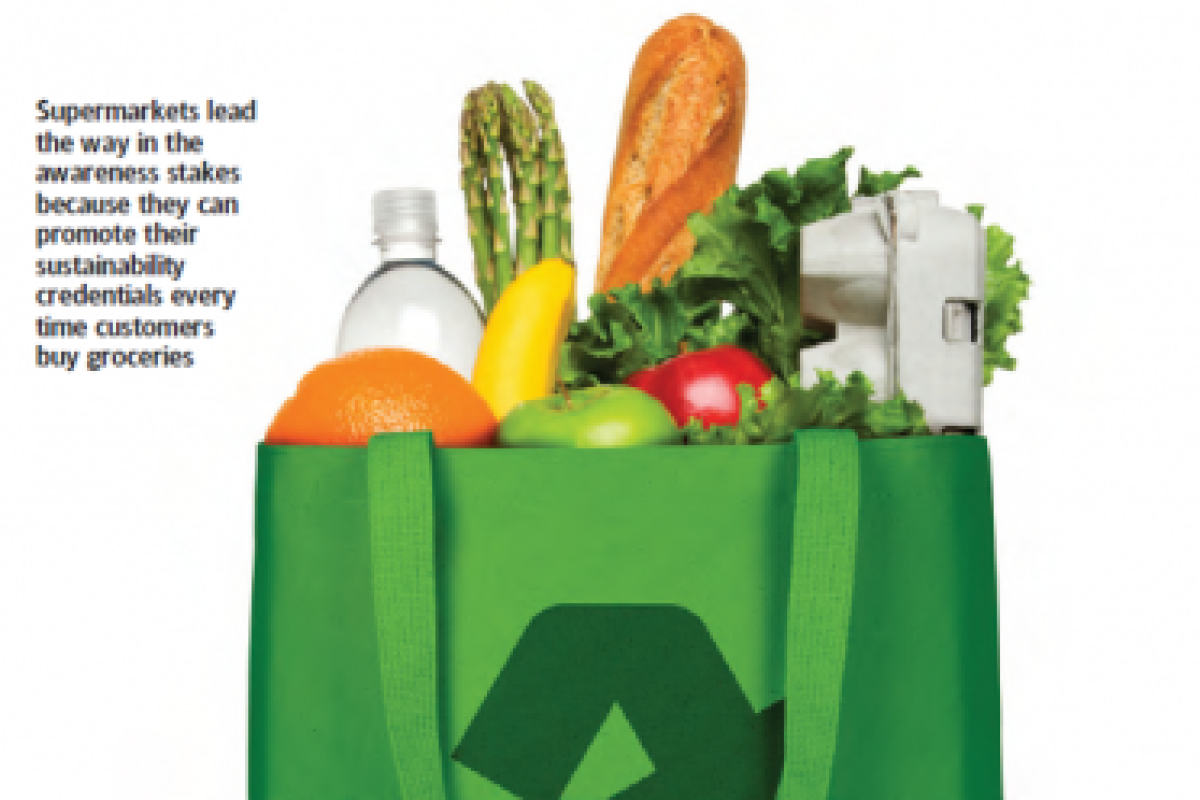Despite the extensive coverage of the idea of ‘sustainability’, less than half the population (44%) know that it refers to the environment. If you ask UK consumers what a ‘sustainable company’ is they’re just as likely to say it’s one that is financially viable. It’s easy to understand their confusion and, in principle, their answer is not wrong.
The economic climate hasn’t helped. People just aren’t willing to pay a substantial price premium for sustainably produced goods.
Factors such as value for money, recognised brand and good customer service are simply more important.
We asked people to name some ‘sustainable companies’ in a recent study among 1,000-plus UK consumers. All of the following findings are based on people who understand the environmental meaning of sustainability*.
The sector that performs best is supermarkets. Six of the top ten most sustainable companies are supermarkets.
Therefore, in the eyes of consumers, the big retailers are doing well. It’s easy to see why supermarkets lead the way. When people do their weekly grocery shopping, the businesses have ample opportunity to shout about their sustainability credentials.
Although as a sector supermarkets are all doing well, there are some that shout louder than others – and their message is hitting home. The Co-op and Marks & Spencer are seen as the most sustainable and environmentally aware supermarkets and they are seen as the most sustainable companies of them all with 32% and 22% ‘sustainable’ scores respectively. Up there with the supermarkets in the top ten sustainable companies are online retailers and services – led by eBay and Google. In fact, the entire sustainability top ten is made up of supermarkets and online retailers/services with not a huge amount of differentiation between the different sector players.
These results aren’t surprising if you think about it. Go to the Co-op’s food website and within one click you’re taken to a whole section about ‘food ethics’; and you can’t move in M&S without seeing one of its ‘Plan A’ posters. It is interesting that you see similar messages in other sectors but the messages just aren’t resonating as well.
Take BP for example – a huge section of its website is dedicated to sustainability, and the company talks about it in its advertising, but it scored one of the lowest sustainability scores in our study – which was conducted before the oil spill in the Gulf of Mexico.
The energy sector scored the lowest ‘sustainable’ score in our study despite the fact that it can probably talk about renewable energy more easily and with more conviction than anyone else.
Some fmcg players also find themselves positioned as relatively ‘unsustainable’ – for example, 28% of people rated Coca-Cola as ‘unsustainable’ versus only 10% who thought it was ‘sustainable’.
So what can other sectors learn from supermarkets? What makes a company ‘sustainable’ in consumers’ eyes? Are they missing a trick or is it simply that consumers have a better relationship, and more frequent interaction, with supermarkets?
At a general level, the drivers of ‘sustainability’ are multi-faceted and consumers believe that for a company to be considered sustainable, it must show sustainable credentials across several measures. The key ones are being environmentally friendly (which in itself has many layers) and behaving responsibly as an employer.
Supporting good causes is an influencing factor, as is being seen as an ethical company. There doesn’t appear to be a quick win when it comes to sustainability. It can’t just be a second thought. And you can’t communicate just one dimension of sustainability, otherwise the consumers won’t see the full picture. If you want to improve your sustainability credentials you need to prove you’re in it for the long haul.
* Incite’s sustainability survey was conducted in April 2010 among 1,009 UK consumers. The study included 45 companies, covering eight sectors (supermarkets, energy suppliers, fmcg, banks, financial services, online retailers, technology and telecoms). Full details are available from Incite
Marketing Planning – www. incite.ws Emma Davies is an associate at Incite Marketing Planning. [email protected]
Most people just aren’t willing to pay a substantial price premium for sustainably produced goods
